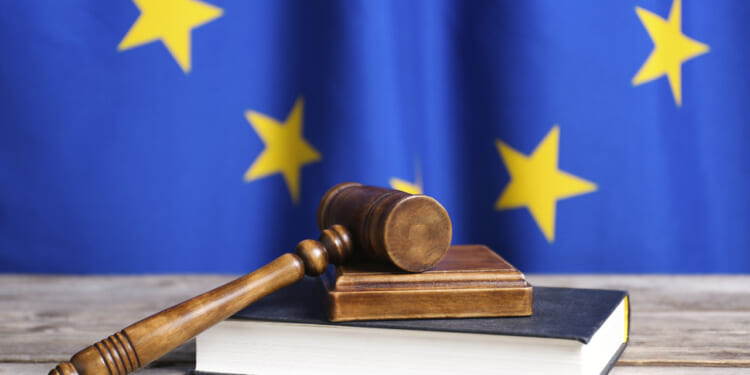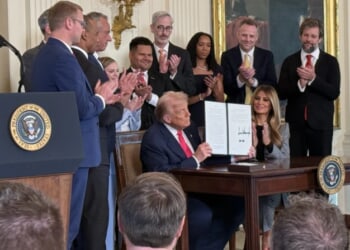The courts must uphold the law, not politics, when ruling in cases that try to halt President Trump’s energy agenda.
There’s a shifting wind in American jurisprudence. The so-called “environmental” groups are grasping at straws—using strategic litigation to shut down the use of America’s abundant natural resources. Yet our ability to responsibly access those resources is inextricably tied to the freedom and wealth of our nation.
In a case that began in 2017, an enormous battle was waged over the Dakota Access Pipeline—a 1,172-mile artery of American energy—and victory was rooted in sound science, the rule of law, and common sense. But the fight is far from over.
America’s energy advantage is real and measurable. The United States produces about 120 billion cubic feet of natural gas every day—enough to power more than 70 million homes and to keep our allies’ lights on across the Atlantic. That scale makes America the world’s leading natural gas producer and the top LNG exporter, supplying nearly half of the liquefied natural gas imported by Europe. This production is not accidental—it is strategic, and under President Trump’s renewed leadership, energy policy once again prioritizes domestic production, infrastructure expansion, and exports that strengthen national security and global stability.
But a new lawsuit filed by Greenpeace International in the Netherlands could unjustly undermine that competitiveness, disrupt support to our allies, and cripple America’s energy sector. This is lawfare—the misuse of courts to deliver policy outcomes that erode the United States’ freedom and energy security.
Greenpeace International, headquartered in the Netherlands, with a branch in the United States, is seeking to recoup a $660 million judgment issued by a North Dakota state court in March 2025. That verdict, which has since been reduced to $345 million, held Greenpeace responsible for organizing violent and destructive protests against the Dakota Access Pipeline—actions that included trespassing, vandalism, and arson. Having failed through protest and defamation against Energy Transfer Partners, Greenpeace is now turning to the European Union’s courts to relitigate a case it has already lost.
Ironically and incredibly, Greenpeace is invoking a new EU directive that prohibits strategic lawsuits against public participation (SLAPPs)—a law originally intended to protect free expression but now perverted by activists into a shield for their own misconduct and illegal and violent deeds. These so-called “environmental” and radical groups are using SLAPP protections as a defensive tool to justify frivolous cases they cannot win on the merits. Their goal is not to prevail in court but to silence legitimate voices through intimidation, delay, and the crushing cost of legal defense. That’s Greenpeace’s tactic against Energy Transfer Partners.
The North Dakota case was never about Greenpeace’s right to speak or protest under the US Constitution. It was about a pattern of illegal behavior designed to bankrupt an American energy company and the livelihoods of the workers who depended on it.
Now, Greenpeace wants the EU to overturn the North Dakota jury’s decision and force Energy Transfer Partners—the pipeline’s operator—to pay restitution to Greenpeace. But even within Greenpeace, the move is proving divisive: its general counsel and senior legal advisor have resigned, and its executive director was ousted last year amid a power struggle over the case. These fractures underscore a deeper shift within the broader environmental movement, as some organizations have abandoned legitimate advocacy for extremism.
The so-called environmental groups are growing bolder. One group, Shut the System (STS), recently announced it was launching “a new phase of the climate activist movement” aimed at “shutting down key actors in the fossil-fuel economy.” A Swedish activist’s book, How to Blow Up a Pipeline, has been praised by mainstream outlets for urging the destruction of energy infrastructure.
Environmental activism is now crossing the line into eco-terrorism and lawfare. The US Federal Bureau of Investigation defines eco-terrorism as “the use or threatened use of violence of a criminal nature against innocent victims or their property by an environmentally oriented, subnational group for environmental-political reasons.”
If these organizations continue escalating their tactics, law enforcement and the courts must respond quickly and decisively. That’s what the North Dakota jury did. The US Department of Justice should follow suit—and European courts have no business interfering.
The Trump administration has prioritized energy dominance within its agenda portfolio, positioning America’s energy sector to be able to deliver reliable, affordable power at home and abroad for many decades to come. America is strengthening its competitiveness, security, and prosperity. But if activist groups want to continue their war on energy infrastructure, American courts must stand firm, and European courts must stand down.
About the Authors: Aurelia S. Giacometto and Jason Isaac
Aurelia S. Giacometto is a partner at Earth & Water Law. She served as the 22nd Director of the U.S. Fish and Wildlife Service during the Trump Administration (2019–2021) and as the 14th Secretary of the Louisiana Department of Environmental Quality. She is an attorney, businesswoman, biologist, and international speaker.
The Honorable Jason Isaac is the founder and CEO of the American Energy Institute. He previously served four terms in the Texas House of Representatives. He served on the Energy Resources and Environmental Regulation committees, among others. During his eight years of service, he successfully passed legislation to reduce taxes, strengthen election integrity, improve public education, preserve Second Amendment rights, protect local groundwater, and protect private property rights. Jason is a graduate of Stephen F. Austin State University.
Image: Shutterstock/New Africa


















